Overview
The article titled "7 Essential Cloud Systems for Property Recordkeeping Success" focuses on identifying key cloud systems that enhance efficiency and effectiveness in property recordkeeping. It highlights how these systems improve accessibility, security, cost management, scalability, and compliance. Consequently, property professionals can streamline their workflows and adapt to the evolving demands of the industry.
Introduction
Cloud systems are revolutionizing the property recordkeeping landscape by providing a comprehensive suite of essential tools that significantly enhance efficiency, security, and collaboration. As the real estate industry increasingly embraces digital solutions, professionals are uncovering how these technologies can streamline workflows, reduce costs, and improve compliance.
However, a critical question arises: how can organizations effectively leverage these cloud systems not only to adapt to the evolving market but also to secure a competitive edge in their title research operations?
Parse AI: Automate Title Research with Advanced Machine Learning
Parse AI employs advanced machine learning algorithms to streamline the extraction of vital information from document titles. This innovative technology drastically reduces the time needed for , enabling industry professionals to concentrate on more strategic initiatives. By automating repetitive tasks, Parse AI not only boosts accuracy but also significantly reduces human error, establishing itself as an indispensable resource for property companies striving to enhance workflow efficiency.
As the industry increasingly embraces machine learning, the potential for heightened productivity and lower operational costs becomes clear, with many professionals acknowledging the advantages of automation in their daily routines. According to a recent survey:
- 80% of businesses indicated that while machine learning seldom decreases expenses, it frequently increases revenue, highlighting the financial advantages of adopting such technologies.
Furthermore, insights from industry leaders underscore the transformative impact of automation in research, with one director remarking, 'The efficiency gained through machine learning has allowed us to focus on strategic growth rather than getting bogged down in manual processes.
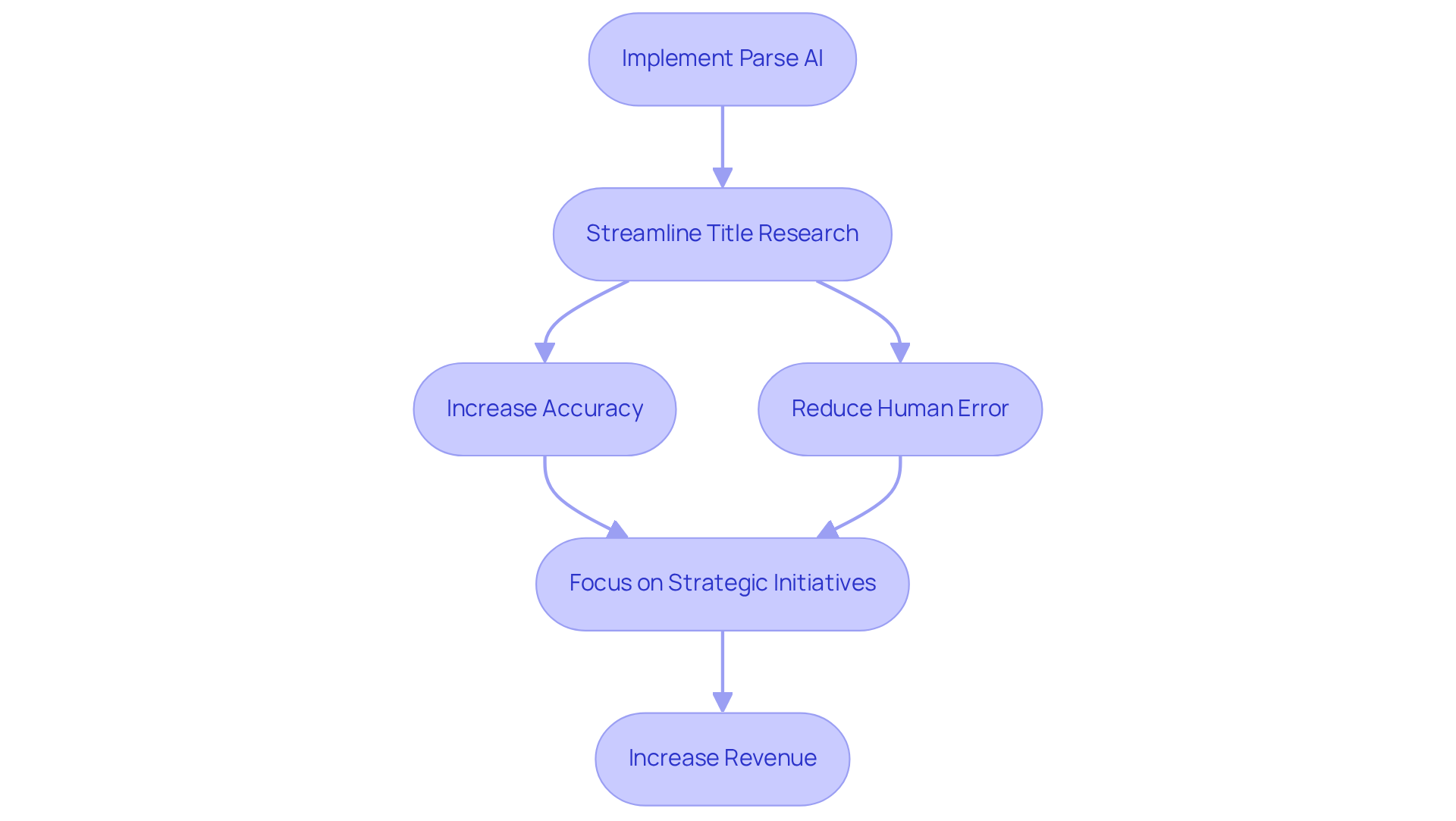
Cloud Systems: Enhance Accessibility and Collaboration for Title Research
Cloud systems for property recordkeeping empower property professionals to access ownership documents and research tools anytime, anywhere, significantly enhancing collaboration among team members. This flexibility enables title researchers to work together seamlessly, irrespective of their physical locations. By leveraging cloud-based platforms, they can share insights, updates, and documents in real-time, which not only boosts productivity but also fosters a culture of teamwork.
With 85% of businesses utilizing online-based tools for collaboration, and 83% asserting that these solutions have markedly , the real estate sector increasingly recognizes the vital role of these technologies in streamlining workflows. Furthermore, online solutions facilitate effective communication, ensuring that all participants in a transaction remain informed and engaged throughout the process.
As organizations transition to entirely digital operations, the ability to collaborate efficiently in a virtual environment becomes crucial for maintaining a competitive edge in the market. Moreover, organizations with robust collaboration levels experience a 25% increase in productivity, underscoring the significance of digital systems in enhancing operational efficiency.
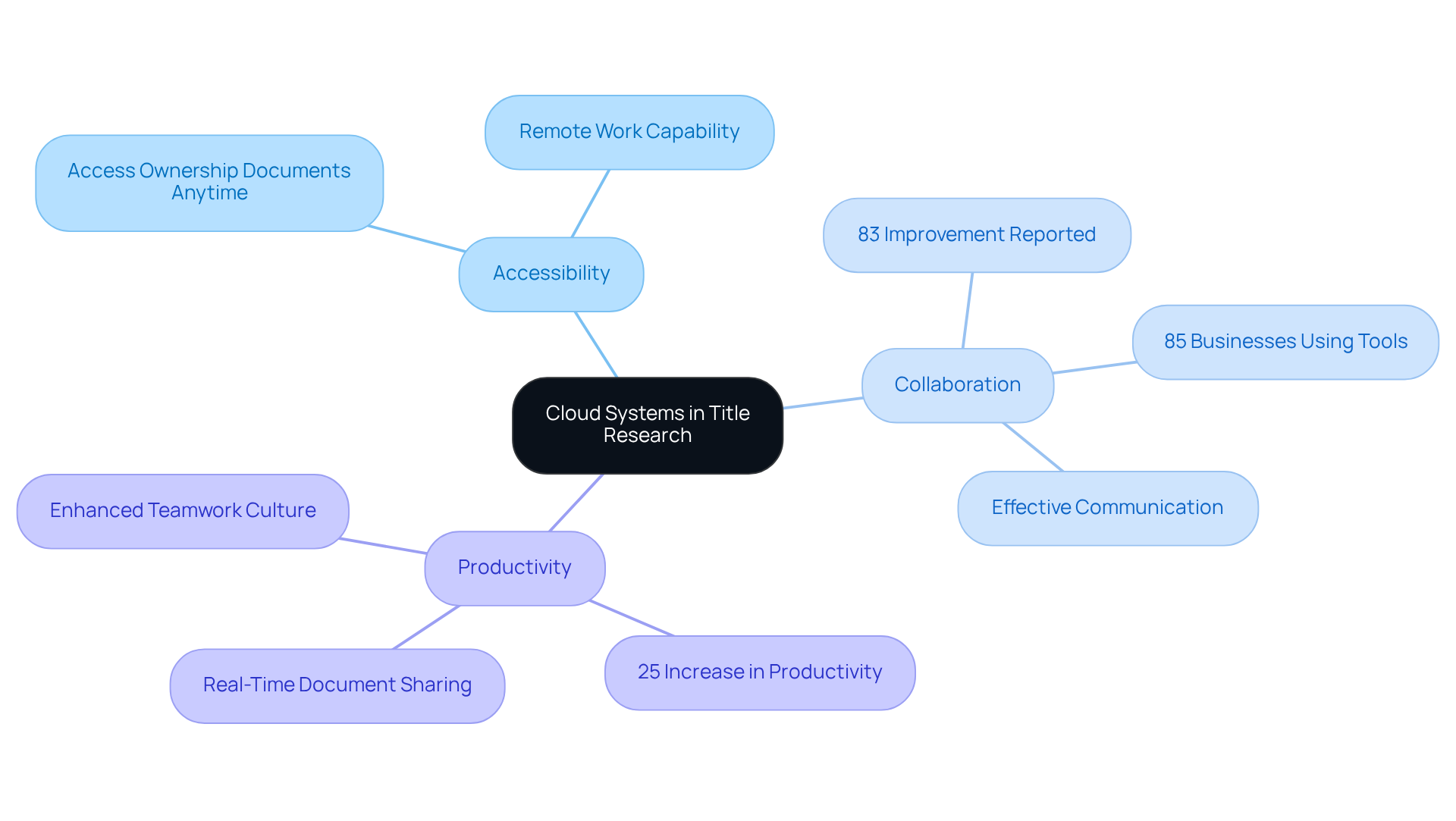
Cloud Systems: Improve Security and Compliance in Property Recordkeeping
Cloud systems for property recordkeeping significantly enhance the security of property records through advanced encryption and stringent access control measures. By ensuring that only authorized personnel can access sensitive information, these systems effectively mitigate the risk of data breaches, which have become increasingly prevalent. Notably, 82% of involved cloud-stored information, underscoring the necessity for robust security protocols.
Furthermore, service providers typically adhere to industry regulations, which is essential for title researchers aiming to uphold compliance with legal obligations and industry standards. Compliance rates for online systems in real estate are on the rise, as many organizations recognize the importance of aligning their practices with regulatory frameworks. For instance, 51% of organizations plan to increase security investments, demonstrating a commitment to enhancing compliance measures.
As the landscape of internet technology evolves, the integration of compliance measures within cloud systems for property recordkeeping becomes crucial for safeguarding property records and ensuring operational integrity. However, challenges persist; securing data across environments proves more difficult than anticipated, with 56% of organizations struggling to maintain consistent data protection. Additionally, human error accounts for 88% of all data breaches, emphasizing the need for ongoing training and awareness to mitigate risks. Misconfigurations also pose a significant threat, representing 31% of security breaches in the digital environment, further complicating the compliance landscape for title researchers.

Cloud Systems: Reduce Costs in Title Research Operations
Implementing online systems presents significant opportunities for cost reductions in title research operations. By minimizing the need for physical infrastructure and lowering maintenance costs, real estate professionals can allocate resources more effectively.
Furthermore, internet-based solutions typically operate on a subscription model, allowing companies to tailor their usage according to their needs without incurring unnecessary expenses. For instance, organizations that transition to remote servers can achieve savings of up to 45.76% in operational costs compared to traditional setups.
Realty companies like Concreit have successfully harnessed online technology to expand investment opportunities, illustrating how digital solutions can enhance financial efficiency and accessibility within the sector.
Moreover, the global real estate software market is projected to reach $13.46 billion by 2026, with a compound annual growth rate (CAGR) of 12.2% from 2021 to 2026, underscoring the increasing importance of online solutions in the industry.
Overall, the are clear, as they not only lower operational costs but also enable firms to focus on core business activities, thereby driving profitability and growth.
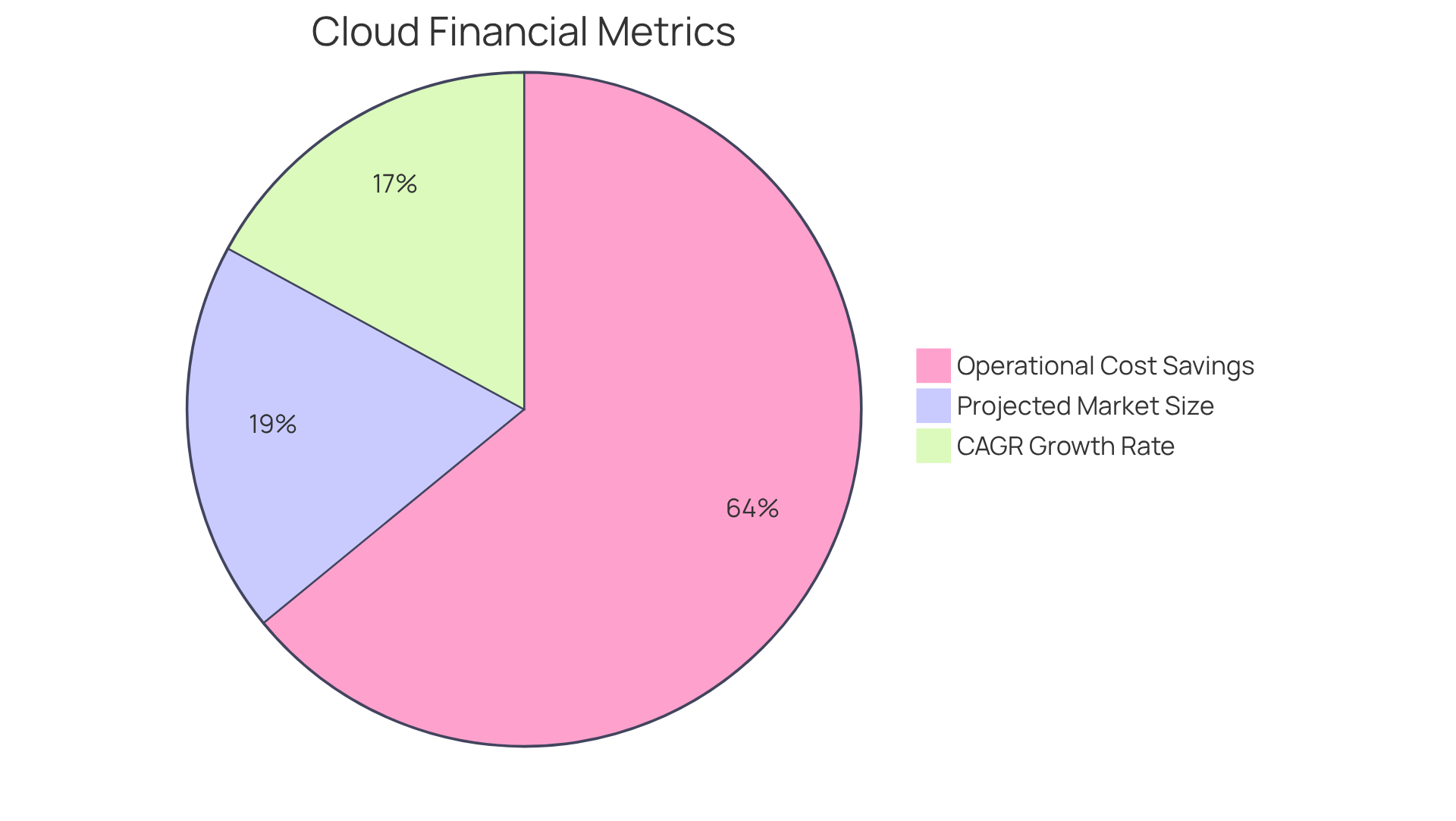
Cloud Systems: Scale Effortlessly with Growing Property Records
Cloud systems are engineered for seamless scalability, rendering them exceptionally suited for research operations that encounter fluctuating data volumes. As property records continue to expand, cloud systems for property recordkeeping have the capability to dynamically enhance their storage and processing capabilities without requiring substantial upfront investments. This ensures that title researchers can adeptly manage increasing datasets while maintaining optimal performance and accessibility.
In fact, 71% of organizations anticipate a rise in spending on online services, underscoring a broader trend toward leveraging technology to navigate the complexities of data growth in real estate. Furthermore, with 63% of small and medium-sized enterprises expected to handle their workloads in online environments, the shift toward cloud systems for property recordkeeping is not merely a trend but an essential strategy for sustaining operational efficiency amid escalating property record demands.
By embracing online solutions, researchers can streamline their workflows, enhance data management, and ultimately elevate service delivery. As Sebastian Straub aptly noted, "In 2025, this technology isn’t just a tool—it’s the backbone of business," emphasizing the critical role of this innovation in contemporary operations.
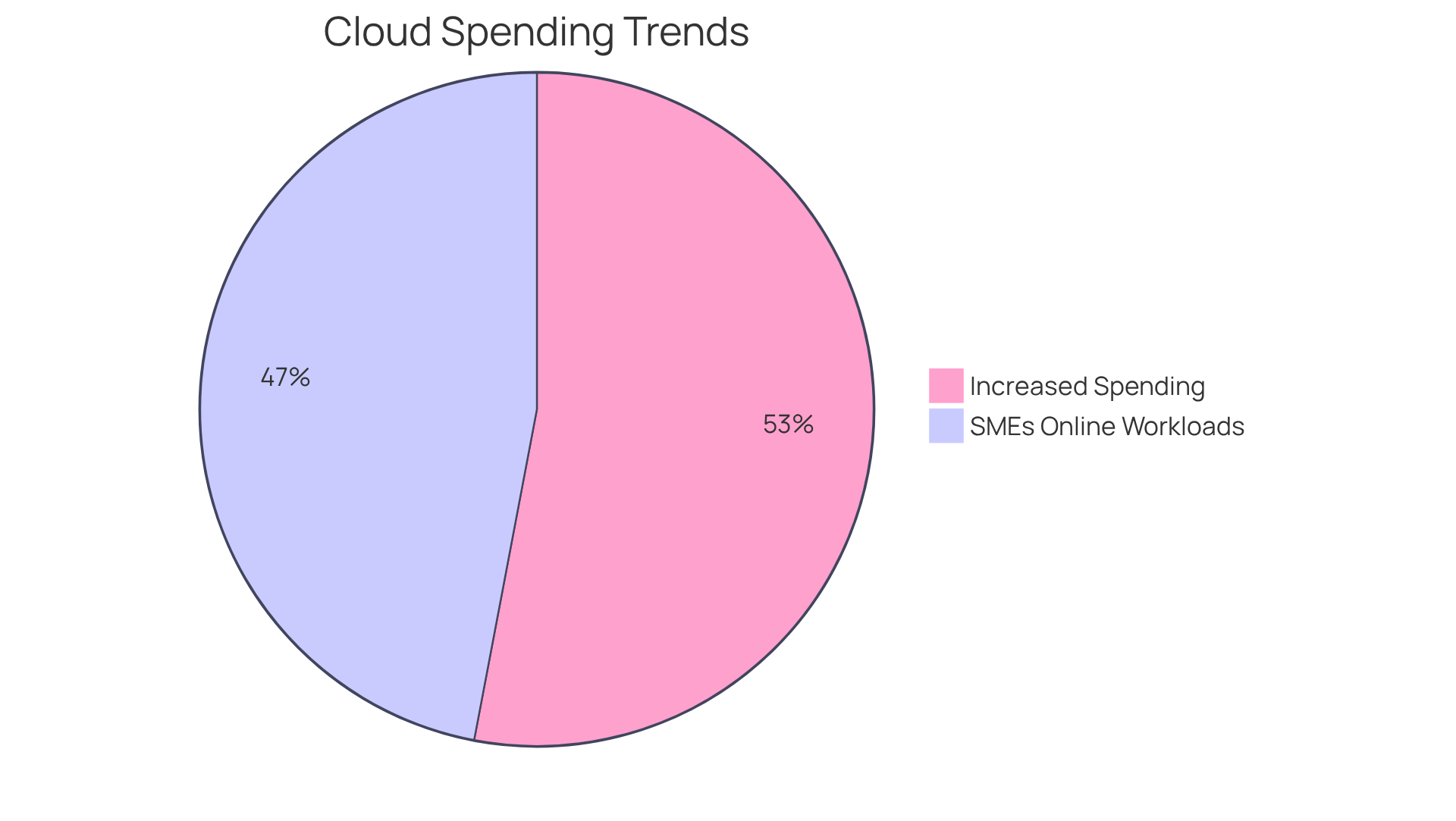
Cloud Systems: Streamline Workflows for Efficient Title Research
Incorporating cloud systems into document research workflows significantly enhances processes and eliminates bottlenecks. These advanced cloud systems for property recordkeeping facilitate the automation of routine tasks—such as document retrieval and data entry—allowing researchers to concentrate on more complex analyses. Consequently, organizations experience improved productivity and reduced turnaround times for report generation.
For instance, organizations that have implemented automation have reported a cost reduction of 24%, an increase from 19% in 2019. Furthermore, 66% of knowledge workers indicate a boost in productivity due to automation, enabling professionals to deliver accurate reports faster than ever before. This shift not only but also positions firms to respond swiftly to client needs, ultimately enhancing service quality in the competitive real estate market.
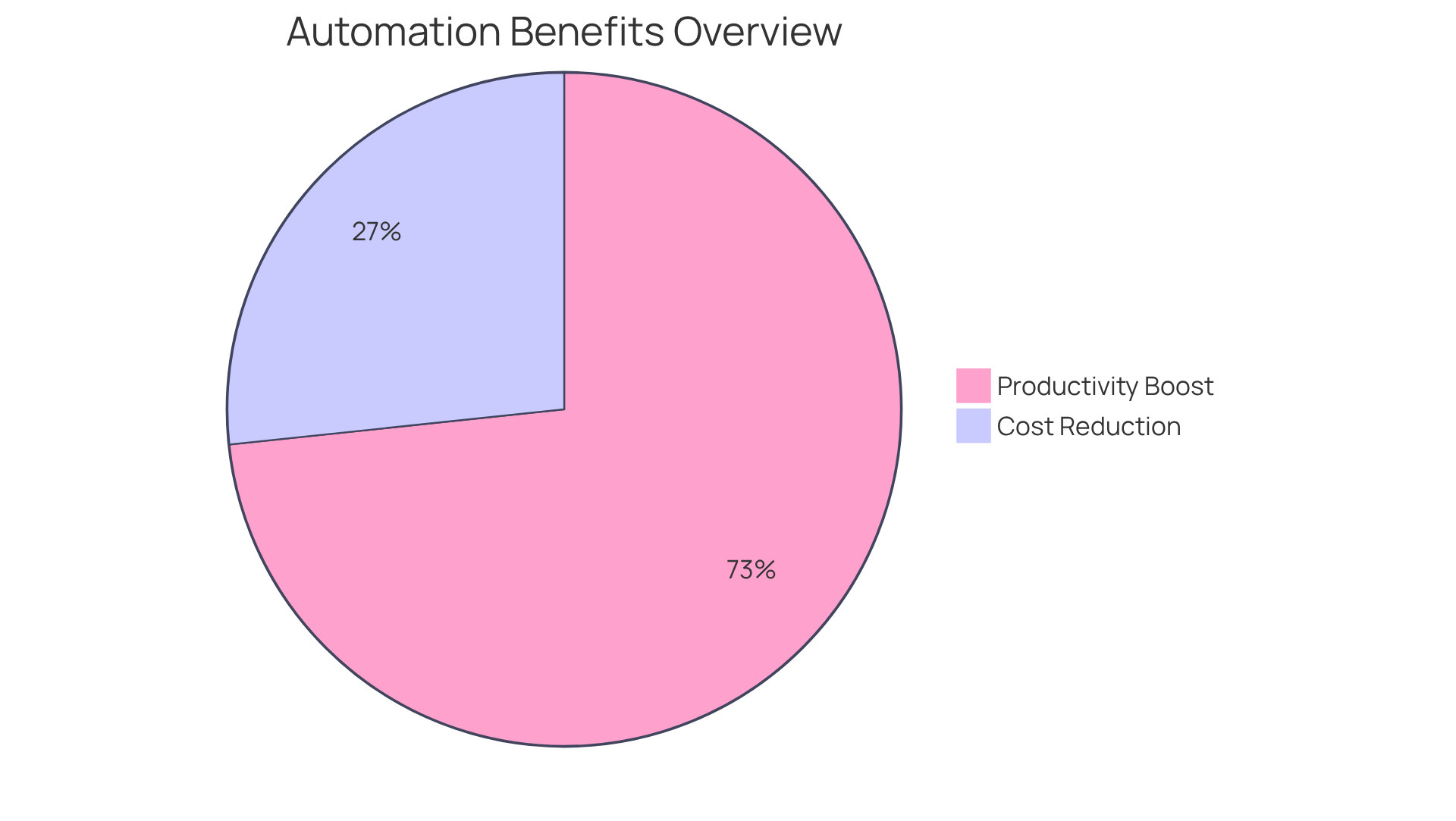
Cloud Systems: Integrate Seamlessly with Other Title Research Tools
Cloud systems are designed to integrate seamlessly with various research tools, such as document management systems and data analytics platforms. This interoperability empowers title researchers to capitalize on their existing technology investments while expanding their capabilities.
By linking different tools, professionals can establish a cohesive ecosystem that enhances data flow and collaboration throughout their operations. For instance, 60% of organizations have reported increased revenue from adopting digital platforms, underscoring the financial benefits of such integrations. Furthermore, 94% of enterprises recognize that digital infrastructure significantly aids in meeting compliance requirements, highlighting the growing importance of interoperable technology in ensuring regulatory adherence.
Expert insights indicate that interoperability not only boosts efficiency but also reduces the time spent on data management tasks, allowing researchers to focus on more strategic initiatives. Ultimately, the integration of cloud systems for property recordkeeping into transcends mere technological enhancement; it represents a strategic move that enhances overall productivity and efficiency within the real estate sector.
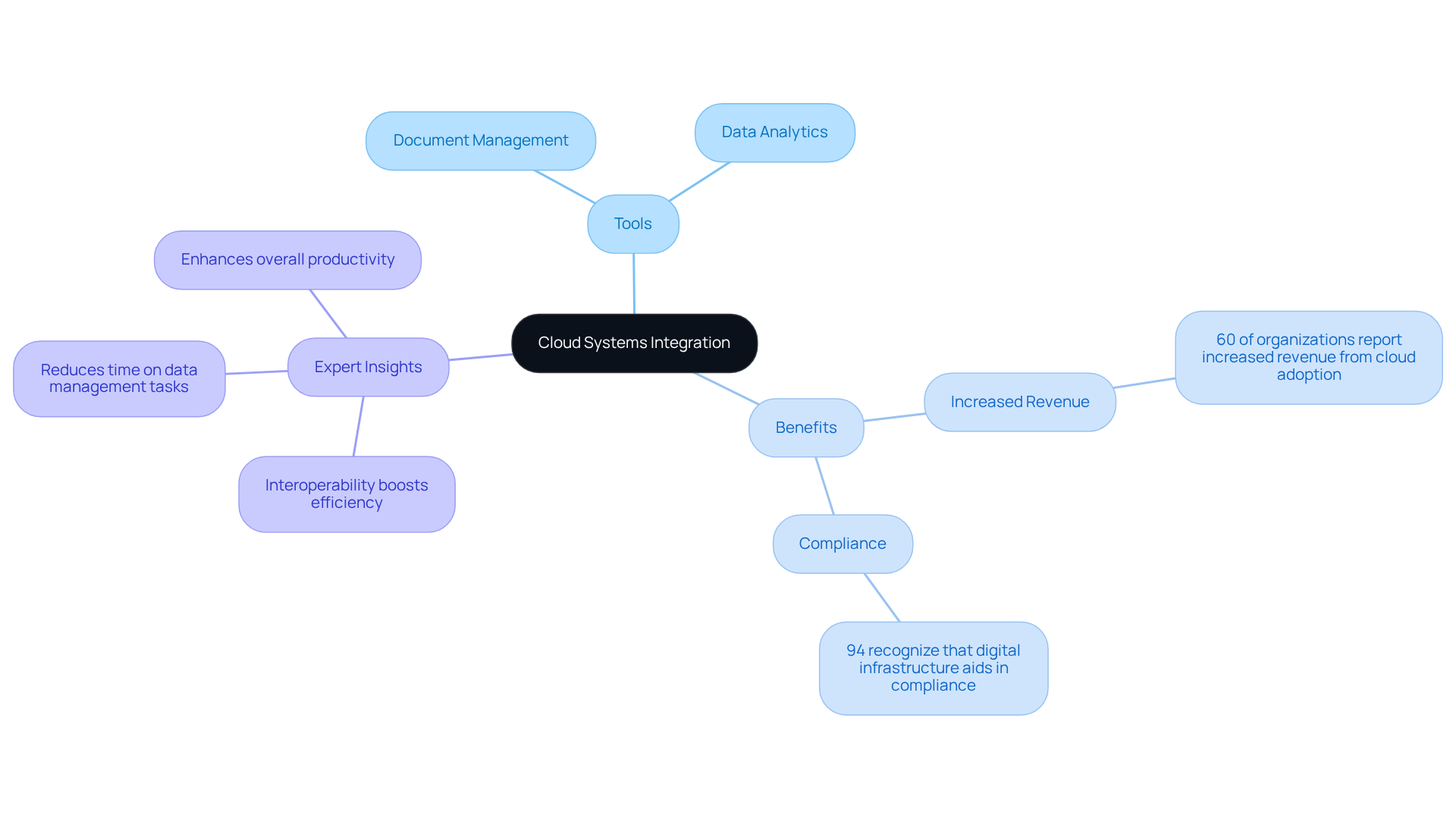
Cloud Systems: Promote Eco-Friendly Practices in Title Research
Employing online systems in document research significantly encourages eco-friendly practices by decreasing reliance on paper and physical storage. By converting documents into digital formats and saving them online, property researchers can markedly reduce their environmental impact. This shift not only but also enhances efficiency, making information more accessible and easier to manage. Consequently, the transition to digital documentation is not merely a trend; it is a vital step toward a more sustainable future.
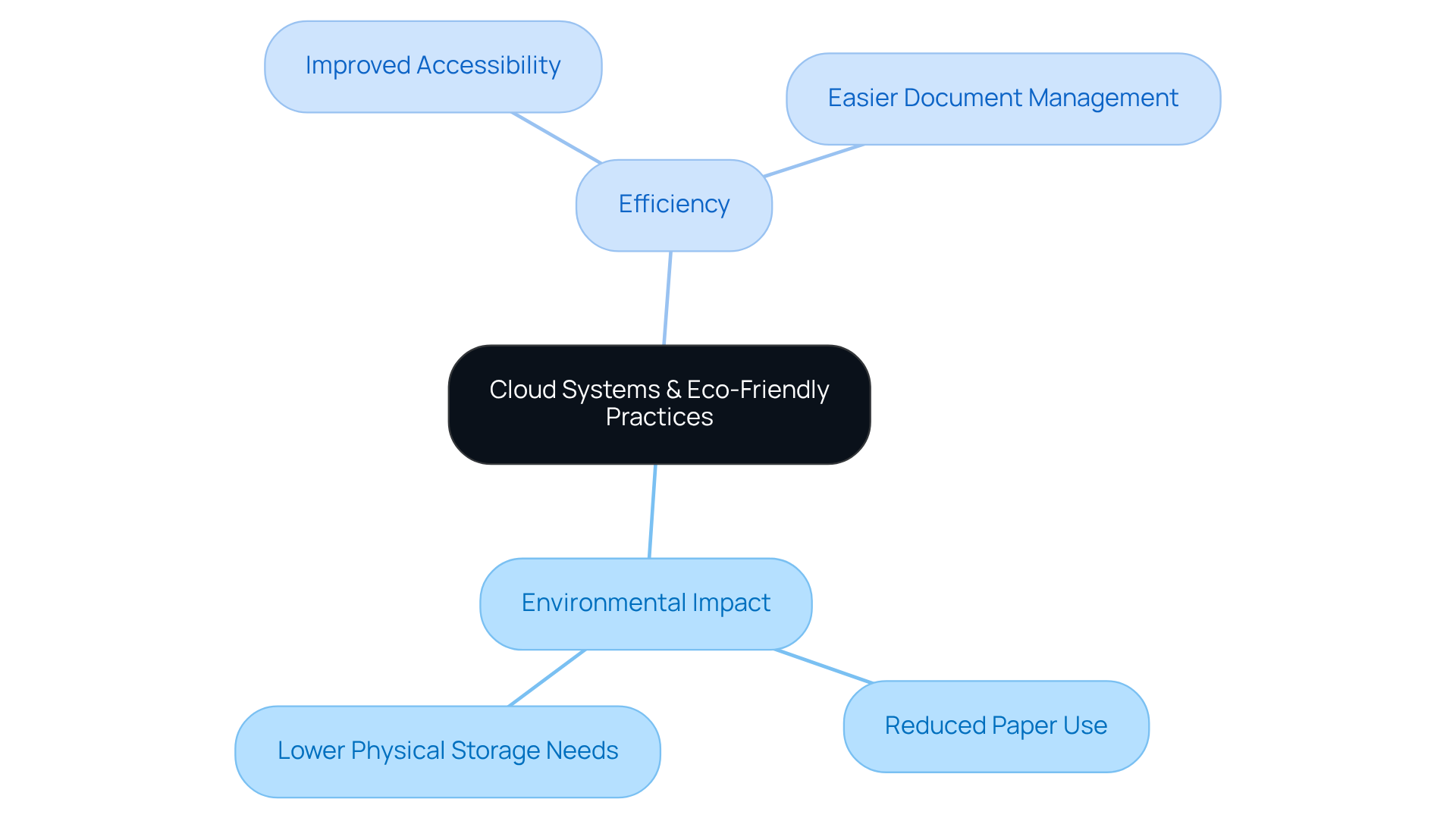
Cloud Systems: Ensure Governance and Compliance in Property Records
Cloud systems for property recordkeeping play a pivotal role in ensuring compliance within title research operations by offering robust governance features. These cloud systems for property recordkeeping typically incorporate essential elements such as:
- Audit trails
- Access controls
- Comprehensive reporting capabilities
These features enhance transparency and accountability. For instance, 61% of organizations have established internal reporting policies to pinpoint compliance issues and cybersecurity threats, illustrating the direct connection between these policies and the governance capabilities of online systems. By embracing online solutions, real estate experts can effectively navigate the intricacies of compliance, ensuring that sensitive data is handled securely and in accordance with industry regulations.
Significantly, 82% of all data breaches involve information stored online, with the average cost of breaches related to this data reaching USD 4.57 million, highlighting the financial consequences of non-compliance. Furthermore, the challenges posed by shadow IT present significant risks in online environments, making it essential for firms to uphold strict governance. Grasping the shared responsibility model is also vital, as it elucidates the roles of both the service provider and the organization in upholding security and compliance. Realty companies that utilize cloud systems for property recordkeeping not only enhance their operations but also strengthen their compliance stance, ultimately protecting their business interests.
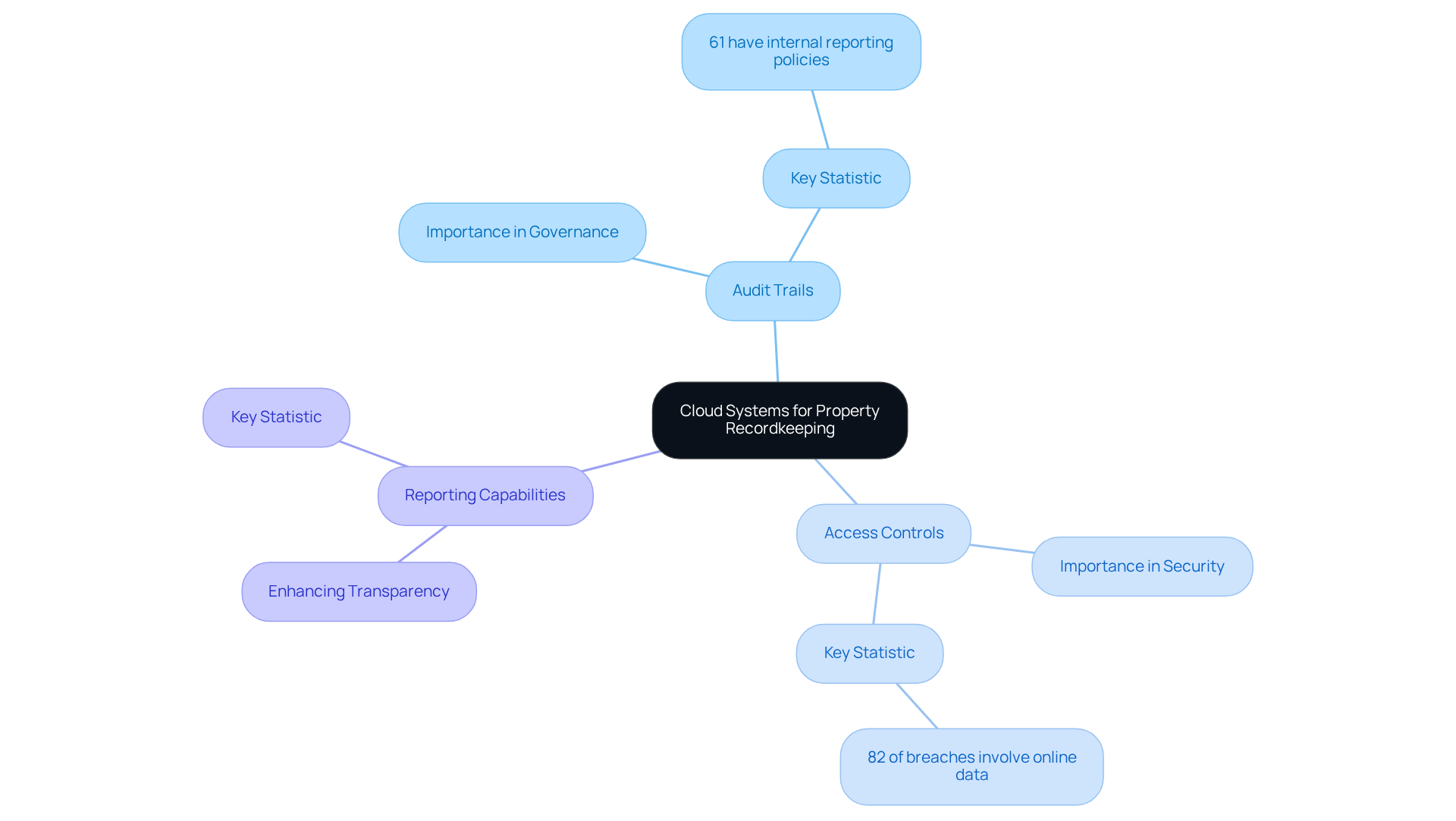
Cloud Systems: Essential Benefits for Modern Title Research
Cloud systems for property recordkeeping are revolutionizing title research in property by offering a range of crucial advantages that enhance competitiveness and operational efficiency. The significance of accurate title research cannot be overstated, as it forms the backbone of successful property transactions. However, traditional methods often face challenges that can hinder performance. Fortunately, cloud technology provides effective solutions to these challenges.
- Enhanced Accessibility: Cloud platforms empower real estate professionals to access critical data from any location, facilitating quicker decision-making and fostering improved client interactions.
- Enhanced Security: With robust data protection measures, including encryption and access controls, online solutions safeguard sensitive information such as social security numbers and credit scores—integral elements in property transactions.
- Cost Reductions: The subscription-based model of online services significantly lowers upfront expenses when compared to conventional IT infrastructure, enabling companies to allocate resources more efficiently. As Sommer Figone noted, "The cloud also assists property firms in saving a significant sum of money, as the cloud provider manages the expenses of infrastructure, upgrades, cooling, power, software licenses, etc."
- Scalability: Cloud technology allows real estate companies to adjust their resources according to demand, ensuring they can manage fluctuations in workload without incurring unnecessary costs.
- Streamlined Workflows: By automating processes, administrative burdens are reduced, allowing title researchers to concentrate on more strategic tasks, thereby boosting productivity.
- Seamless Integration: Cloud systems facilitate the integration of various applications, such as CRM and ERP, enhancing data management and operational coherence.
- Eco-Friendly Practices: By minimizing reliance on physical infrastructure, virtual solutions contribute to more sustainable business practices.
- Robust Governance: Cloud platforms provide tools for compliance and oversight, ensuring that property firms adhere to industry regulations.
As the property market continues to evolve, the adoption of online technology is not merely advantageous but essential for maintaining a competitive edge. Companies that leverage cloud systems for property recordkeeping are already witnessing improvements in title research operations, positioning themselves for success in a rapidly changing market. For instance, firms utilizing cloud-based ERP systems have reported enhanced project management and compliance, leading to more efficient operations. With the worldwide projected to grow significantly, increasing by $7.2B by 2025, embracing online technology is a strategic investment for property professionals aiming for future success. Furthermore, 80% of real estate firms plan to bolster their cloud investments by 2025, underscoring the growing importance of these solutions in the industry.
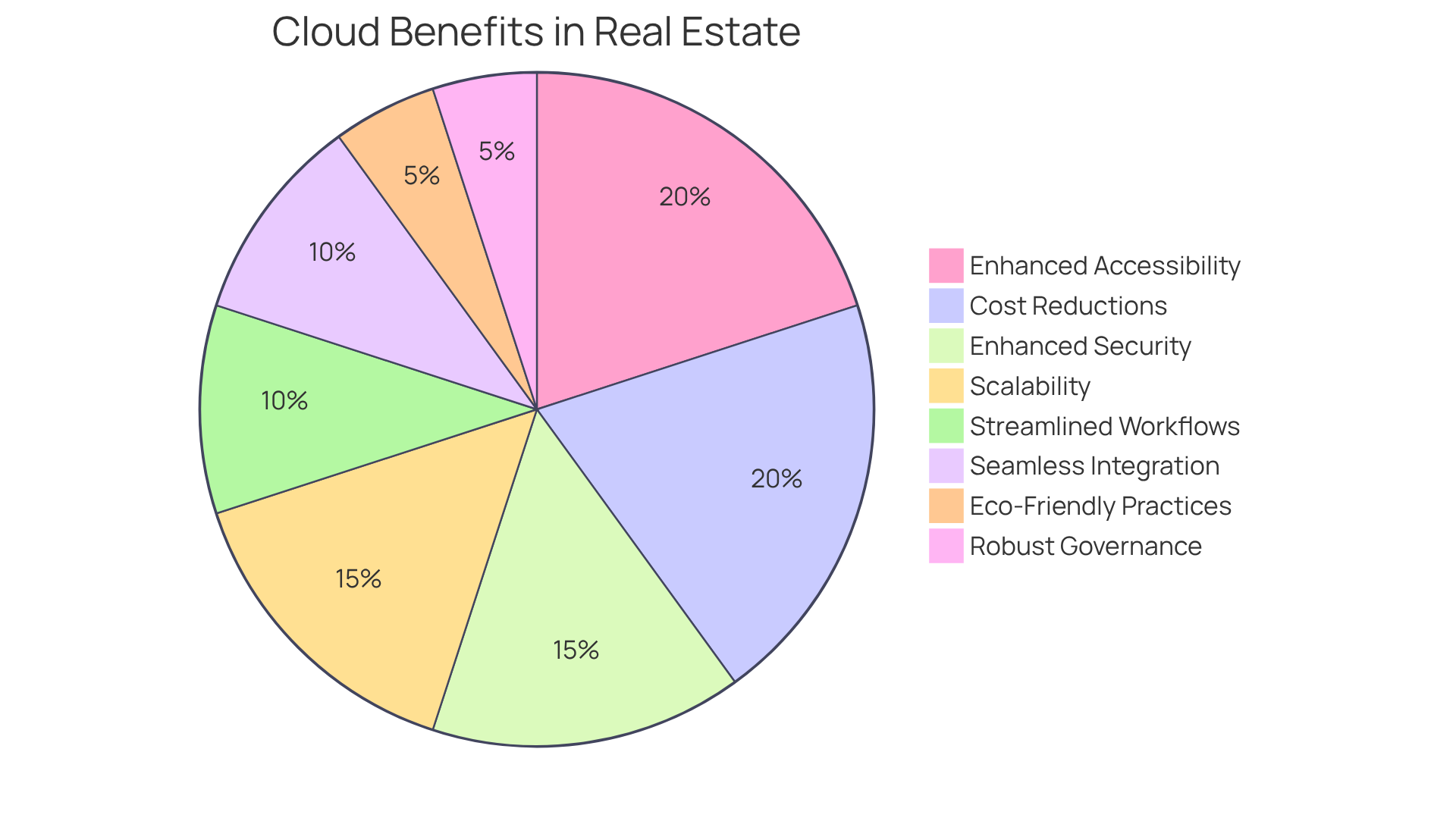
Conclusion
Cloud systems are revolutionizing property recordkeeping, providing essential tools that significantly enhance efficiency, security, and collaboration within the title research process. By integrating advanced technologies such as machine learning and cloud computing, these systems empower real estate professionals to streamline workflows, reduce operational costs, and ensure compliance with industry regulations.
This article highlights several key benefits of cloud systems, including improved accessibility to documents, enhanced security measures, and substantial cost reductions. The automation of routine tasks allows researchers to concentrate on strategic initiatives, while seamless integration with existing tools fosters collaboration and boosts productivity. Furthermore, the scalability of cloud solutions ensures that organizations can adapt to increasing data needs without incurring excessive costs.
As the property market continues to evolve, embracing cloud technology is not merely advantageous but essential for maintaining a competitive edge. The shift towards digital solutions not only supports operational efficiency but also promotes eco-friendly practices by reducing reliance on paper. Real estate professionals are urged to leverage these innovations to enhance their title research capabilities, ensuring they are well-equipped to navigate the complexities of the modern property landscape.
Frequently Asked Questions
What is Parse AI and how does it benefit property research?
Parse AI is a technology that uses advanced machine learning algorithms to automate the extraction of vital information from document titles. It significantly reduces the time needed for property research, allowing industry professionals to focus on strategic initiatives, while also boosting accuracy and reducing human error.
What are the financial advantages of adopting machine learning in businesses?
A recent survey indicated that while machine learning rarely decreases expenses, it often increases revenue. This highlights the financial benefits of integrating such technologies into business operations.
How does automation impact workflow efficiency in property companies?
Automation through technologies like Parse AI allows property companies to streamline repetitive tasks, leading to improved workflow efficiency. Industry leaders have noted that this efficiency enables a focus on strategic growth rather than manual processes.
What role do cloud systems play in enhancing accessibility and collaboration for title research?
Cloud systems enable property professionals to access ownership documents and research tools anytime, anywhere, which enhances collaboration among team members. This flexibility allows seamless teamwork regardless of physical location, boosting productivity and fostering a culture of teamwork.
What statistics reflect the impact of online-based collaboration tools in businesses?
According to statistics, 85% of businesses use online-based tools for collaboration, and 83% of them report significant improvements in their collaboration efforts. This indicates the growing recognition of digital solutions in streamlining workflows.
How do cloud systems improve security and compliance in property recordkeeping?
Cloud systems enhance security through advanced encryption and strict access control measures, reducing the risk of data breaches. They also help organizations comply with industry regulations, as many service providers adhere to legal obligations and standards.
What are the challenges associated with data security in cloud systems?
Challenges include the difficulty of securing data across different environments, with 56% of organizations struggling with consistent data protection. Additionally, human error accounts for 88% of data breaches, and misconfigurations contribute to 31% of security breaches.
What measures are organizations taking to improve security and compliance?
Many organizations are planning to increase their security investments, with 51% indicating a commitment to enhancing compliance measures. This reflects the importance of aligning practices with regulatory frameworks in the real estate sector.




